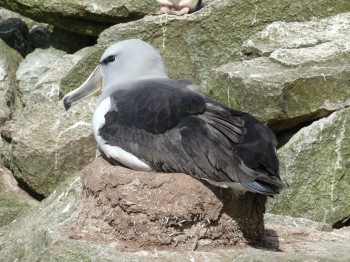Paul Sagar (National Institute of Water & Atmospheric Research, Christchurch, New Zealand) and colleagues have published in the journal Notornis on a decline in a population of the globally Vulnerable Salvin’s Albatross Thalassarche salvini at New Zealand’s Bounty Islands.
The paper’s abstract follows:
"We used data from 3 sources to examine the population size and trend of Salvin’s albatrosses (Thalassarche salvini) breeding on Proclamation Island, Bounty Islands, New Zealand. Island-wide counts of breeding birds during incubation resulted in totals that declined 14%, from 3065 in 1997 to 2634 in 2004. A count of breeding albatrosses over part of the island in 2011 indicated a further decline of 13% between 2004 and 2011, and an overall decline of 30% between 1997 and 2011. Additional counts on part of Depot Island indicated a decline of 10% in the numbers of breeding pairs between 2004 and 2011. Daily observations of 70 nests showed that hatching spanned the period from 5 to 21 November 1997, with a median of 15 November, apart from 5 eggs that had not yet hatched by the end of the study period. Based on the banding and recapture of chicks banded in March 1985 annual survival was estimated at 0.926. The scale of the decline estimated in this population has resulted in the conservation status of Salvin’s albatross being upgraded from nationally vulnerable to nationally critical."

Salvin's Albatross, photograph by Paul Sagar
Reference:
Sagar, P.M., Amey, J., Scofield, R.P. & Robertson, C.J.R. 2015. Population trends, timing of breeding and survival of Salvin's albatrosses (Thalassarche salvini) at Proclamation Island, Bounty Islands, New Zealand. Notornis 62:21-29.
John Cooper, ACAP Information Officer, 23 April 2015

 English
English  Français
Français  Español
Español